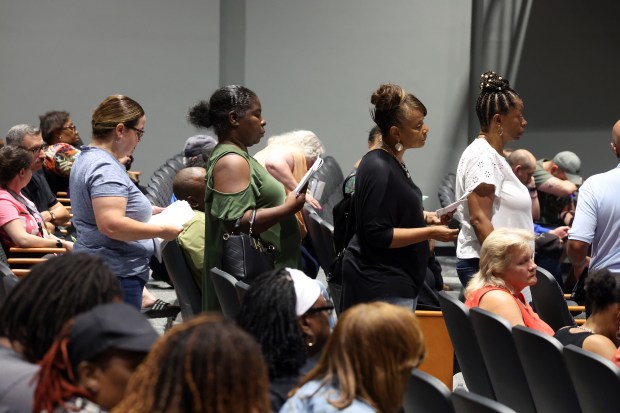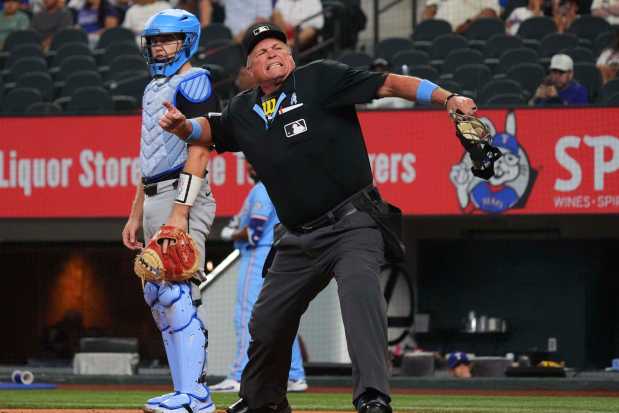Property tax collections this year in the south suburbs dropped due in part to a record spike in tax bills and economic factors such as inflation, a report by Cook County Treasurer Maria Pappas shows.
Overall, the collection rate of taxes this year for the whole of the Chicago area, for the 2023 tax year, was a bit more than 95%, but that was still the lowest collection rate in more than a decade, according to Pappas’ office.
It translates into some $225 million in property taxes that would go to communities, school districts and other taxing bodies not being collected, although property owners delinquent on taxes can still pay their bills and avoid next year’s delinquent tax sale, Pappas said.
For all of Chicago and surrounding suburbs, communities in the south suburbs had the lowest collection rates for property taxes, according to the report.
In the south and southwest suburbs, collections were down by 1.5%, fueled by a 27.7% increase in the number of residential delinquencies, according to Pappas.
Delinquencies jumped after reassessments in that region shifted much of the tax burden from businesses to homeowners. The shift contributed to a record 19.9% increase in the region’s median tax bill, according to the report.
Even though the tax increase was the biggest in the Southland in the last 29 years, the pain was even sharper in communities of color in the south suburbs, a study this summer by Pappas showed.
Median tax bills in 15 south suburbs, 13 of which have mostly Black populations, rose by 30% or more, according to that study.
In Park Forest, for example, the median bill rose from $2,567 to $7,152, and Pappas said the property tax rate in Dixmoor increased 122% this year compared with 2023.
Countywide, property owners this year paid $700 million more in taxes, a 4% increase compared to last year, just below the 4.1% rate of inflation, according to the June report from Pappas.
“Many south suburban residents saw their tax bills jump thousands of dollars this year,” Pappas said in releasing her report Wednesday. “A lot of homeowners had to choose between paying their property taxes on time or buying medicine, food and gas. Now their homes may be at risk.”
Property owners can still pay back taxes owed before delinquent properties go up for sale, although interest on the bills is compounded monthly.
Pappas said a record short period between final tax bills in 2023 and 2024 and the dramatic shift of the tax burden in the south and southwest suburbs likely contributed to the drop in collections. Economic factors, such as higher consumer prices, also may have played a role, she said.
Also, due to rising home values, nearly 4,200 south suburban homeowners who were previously receiving enough tax breaks via exemptions to pay nothing in taxes saw a bill this year, ranging from just a few cents to nearly $11,000.
More than one in 10 households in the south and southwest suburbs still owed taxes in 2024, a 27.4% increase from the previous year, according to the recent Pappas report.
South suburban seniors, in particular, appeared to have had a hard time paying. The number of delinquencies on properties with senior exemptions, indicating it’s the primary residence of someone 65 or older, grew by 50.6% this year, according to the treasurer. She said many, if not most, senior delinquencies will be reversed after assessment errors are fixed.
Countywide, the number of delinquencies, or property owners who had not paid their full tax bills 31 days after they were due, increased by 22,500 to 195,845 this year, compared to 173,345 last year.
Some south suburban communities saw tax collection rates this year that struggled to hit the 50% mark.
Ford Heights’ collection rate of a bit more than 30% was the lowest of all Cook County suburbs, Pappas’ newest report showed.
Of $4.4 million billed this year to taxpayers in the suburb, $1.4 million was collected, according to the report.
However, Ford Heights showed the biggest improvement in collections this year of all suburbs, up nearly 10% from 2023, when taxes owed for 2022 were paid, according to Pappas.
Robbins had a collection rate of 50%, with the treasurer sending out tax bills this year of $8 million, with $4 million collected.
Harvey had a collection rate of 52%, with total tax amounts of $57.8 million billed this year and $30.1 million taken in, according to Pappas’ report.
Dixmoor had a collection rate of just under 74%, wich $7.6 million in taxes billed and $5.6 million collected.
Dolton hit a tax collection rate of 79%, with $59.6 million in taxes billed this year and $47.1 million collected, according to the treasurer.
mnolan@southtownstar.com




